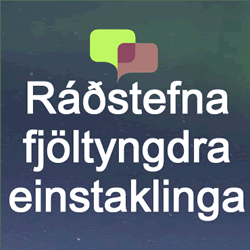In interesting word I learnt recently in Icelandic is spjall [ˈspjatl̥], which means chat, converstation, talk or gossip.
It comes from the Old Norse spjall [ˈspjɑlː] (saying, tale, words, tales, tidings); from Proto-Germanic *spellą (news, message, tale, story), from the Proto-Indo-European *spel- (to tell).
A related word is spjalla, which means ‘to converse, to chat’. You could use it like this, I think,
– Ég er að spjalla á íslensku = I am chatting in Icelandic.
The Proto-Indo-European *spel- is also the root of the English word spell, the German -spiel in Beispiel (example – literally “by talk”) There were similar words in Old English: bīspel (proverb, pattern, example), and Scots: byspel (byword, rarety, outcast).
The German word spielen comes from a different root: the Proto-Germanic *spilōną (to play, to dance, to move), from *spilą (game, play, dance).
Icelandic words with related meanings include:
– tal = speech, conversation
– tala = to talk, to speak
– talmál = spoken language
– talsháttur = phrase, idiom
– talsmaður = advocte, spokesperson
– talsmát = manner of speaking, expression
– ræða = speech, address; to speak, talk, discuss
– ræðinn = talkative
Sources: Wiktionary, Íslensk – ensk orðabók / Concise Icelandic – English Dictionary





